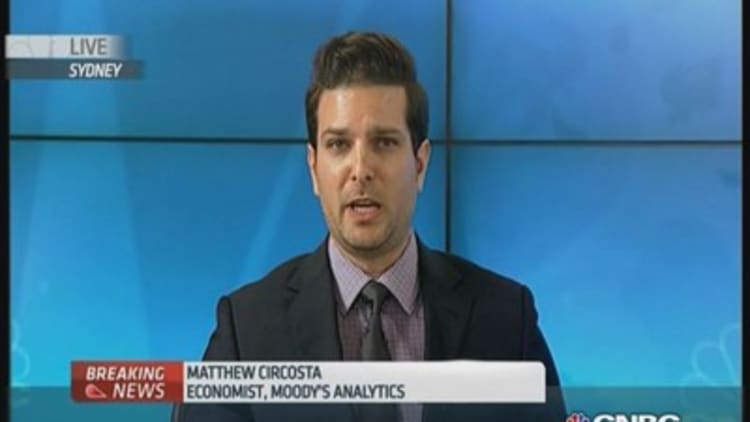
Australia's economy grew at a slower-than-expected pace in the third quarter, underscoring growing concerns about its outlook and calls for the central bank to undertake easing measures.
Gross domestic product (GDP) for the July-September period rose 2.7 percent on year, government data showed on Wednesday, falling short of a forecast in a Reuters poll for a 3.1 percent gain. This compares with an annual 3.1 percent in the second quarter.
Quarter-on-quarter, GDP climbed 0.3 percent, missing expectations for a 0.7 percent increase and falling from the 0.5 percent rise in the second quarter.
Read More Australia holds rates as speculation for cuts mounts
The Australian dollar dived to fresh four-year lows in response, dropping two-thirds of a U.S. cent to $0.8397, its weakest since mid-2010.
"It's a disappointing performance and there are a lot of challenges facing the domestic economy. The real rate of GDP growth is slowly, and you've also got the nominal measures of GDP growth slowing as well with the terms of trade down, corporate profits weakening and household incomes sluggish," said Matthew Circosta, economist at Moody's Analytics.
The Reserve Bank of Australia (RBA) kept interest rates unchanged at a record low of 2.5 percent on Tuesday, reiterating its outlook for a period of stability in rates, despite increasing speculation the central bank would move to cut rates next year.
Read MoreTrouble Ahead for Australia's Economy
Deutsche Bank released a report this week with a bold prediction of two 25 basis-point rate cuts for Australia next year, changing its earlier stance of no change and joining a growing chorus by market watchers for easier monetary policy.
"I think the bias is towards easing. We're neither on the rate hike or the rate cut side," said Circosta, but added that his view is for the RBA to stand pat next year.
"A lot of stimulus is being instituted in Asia: we've seen China cut rates, the bazooka in Japan [and] rate cuts in Korea as well. So that's helping the Asian outlook. I don't think the RBA will cut rates unless we start to see the slowdown getting more excessive. House prices are relatively strong and they don't want to fuel that debt fire as well," he added.
Australia has avoided a recession in the past 25 years, earning the "lucky country" moniker, but there are now concerns lady luck may be walking out.
Read MoreAustralia bears sharpen their claws
According to Evan Lucas from IG, while Australia managed to weather the global financial crisis due to its balance of trade, a commodities boom and a governmental surplus, the same factors now appear to be dragging on growth.
"The economy is facing the lagging impact of the commodity slump, rapid declines in mining investment and further waves of fiscal consolidation. Concurrently, there are likely to be tightening financial conditions and lower levels of housing investment – factors that had previously offset the slump," Lucas said.
"2015 is gearing up to be the stress test of the Australian economy for the millennium," he added.

